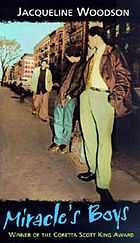Miracle's Boys (novel)
| Miracle’s Boys | |
|---|---|
 | |
| Author | Jacqueline Woodson |
| Country | United States |
| Language | English |
| Genre | Young Adult |
| Publisher | Putnam Juvenile |
Publication date | April 23, 2000 (1st edition) |
| Media type | Print (Hardcover) |
| Pages | 131 (hardcover edition) |
| ISBN | 0-399-23113-7 |
Miracle’s Boys is a young adult novel by Jacqueline Woodson featuring three young bi-racial brothers growing up without parents in New York. It won the Coretta Scott King Award in 2001.
Plot
At twenty-two Ty'ree, the oldest of three brothers, is now caring for his younger siblings. Lafayette, twelve, is still grieving and blames himself for not being able to save his mother, who died from an insulin shock two years earlier; and Charlie, fifteen, has just returned from Rahway Home for Boys where he has been imprisoned for the last two years after being convicted of armed robbery. Ty'ree and Lafayette have built a stable, if quiet, relationship and are comforted by predictable daily routines. Charlie introduces an element of chaos and hostility that neither of his brothers is able to relate to. In response they begin talking to each other in a way they have not been able to previously. They fear for Charlie and want to help him overcome his anger and grief. In attempting to help Charlie, they end up working through their grief as well. The story is told almost exclusively through dialogue with little action actually taking place.[1]
Major themes
This novel has been compared to S. E. Hinton's earlier works, both featuring streetwise orphans who seek understanding of the world through contemporary sources such as films, music and art.[1]
Characters
- Ty'ree - The oldest brother and legal guardian of the younger two siblings. Although Ty'ree is a strong and responsible man, he is also bitter because his mother's death has forced him to take on a series of jobs rather than attend college, which he had been preparing to do when she died. He is also dealing with issues stemming from witnessing when his dad died of hypothermia from saving the lady and dog from drowning in the lake before Lafayette was born.
- New Charlie - Anger is overwhelming the middle brother. He is fifteen and has already served time for armed robbery. If he gets into trouble again social services will take him from Ty'ree, making him a ward of the state. On his return home he is welcomed back by his old friends, and they expect him to act as he did before he left. Charlie is torn between his family's need for him to become a reseruyte[pute[ponsible brother to them and his friends pressure to become one with the street.(New-Charlie)
- Lafayette - 'Laf' feels that he is responsible for his mother passing away because he was the one who found her in a diabetic coma and could do nothing to save her. He has withdrawn into himself, building a wall around himself to keep from getting close to anyone again.
Development history
Woodson wrote this novel in two locations, Whidbey Island off the coast of Seattle, Washington and in Olivebridge, NY. Her goal in writing the book was to create a work with no female characters and to explore what it's like to grow up poor. "I also wanted to write about how hard it is to lose someone you love—in this case, both parents—and how that pain starts shaping itself into other things sometimes like anger and isolation."[2]
Publication history
- 2000, USA, Putnam, ISBN 0-399-23113-7, April 2000, Hardcover.
- 2001, Audio Recording read by Dule Hill. Listening Library, ISBN 0-8072-0525-7.2 cassettes. 2:27 hrs.
Awards and nominations
- Coretta Scott King Honor
- Los Angeles Times Book Prize
- ALA Best Book for Young Adults
Adaptations
A six part miniseries based on the novel was released in January 2012 on Teen Nick. There is also a film 2003 (came out in select theaters only)
In 2001 the book was released as an audiobook. Actor Dule Hill, was given positive reviews for his narration due to his use of staccato, halting vocalizations which underlined the uncertainty of the characters. The abrupt delivery is then contrasted to his softer voice when speaking the memories of the boy's mother. "Hill's narrative style lends a necessary strength to this gritty story of survival in the face of enormous odds." [3] Publishers Weekly's review also called Hill's performance 'powerful' and commends him for his delivery, which adds resonance to Woodson's message of love and hope.[4]
References
- ↑ 1.0 1.1 Horning, Kathleen T., Review: Miracle's Boys. Horn Book Magazine; Mar/Apr2000, Vol. 76 Issue 2, p203-204, 2p.
- ↑ Woodson, Jacqueline. Answers about Young Adult Titles on her webpage, http://www.jacquelinewoodson.com/ya.shtml.
- ↑ Source Citation: Beavin, Kristi. "Miracle's Boys. (Audiobook Reviews)." The Horn Book Magazine. 77.6 (November–December 2001): p780. Literature Resource Center. Gale. Hennepin County Library. 14 January 2010 <http://go.galegroup.com.ezproxy.hclib.org/ps/start.do?p=LitRC&u=hennepin>.
- ↑ Publishers Weekly. 248.37 (10 September 2001): p28. Literature Resource Center. Gale. Hennepin County Library. 14 January 2010